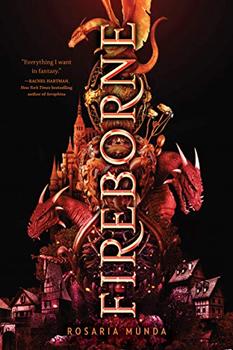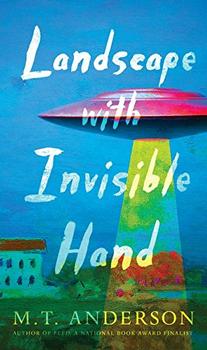Summary | Excerpt | Reviews | Beyond the book | Read-Alikes | Genres & Themes | Author Bio

The final book of The Hunger Games
by Suzanne CollinsIf you are reading this review, chances are that you're wondering if the Hunger Games trilogy lives up to the hype. Yes. A thousand times yes. All you need to do is read the first few pages The Hunger Games to verify this. You'll be pulled in and under. You'll set aside anything else you've been reading. You'll shirk your duties at work. You'll start reading under the table at dinnertime. I quickly learned that the only way I could make myself close the covers would be to break off in the middle of a chapter. If I waited until the end, the unbelievable cliffhanger with which Collins closes every single chapter would catch me and pull me back into the book. The only way to read these books is compulsively.
Katniss Everdeen is already a quiet kind of outlaw when she is chosen by lottery to represent her district in the Hunger Games. Every day she leaves the district's boundaries to hunt for game to supplement her family's meager diet, an act that could get her killed if the leaders of Panem were to discover it. So when she's conscripted into the Capitol's over-the-top spectacle in which teenagers kill each other for survival, an exhibition of brutality designed to reinforce Panem's central authority over the outlying districts, she must decide how to conduct herself. Her covertly acquired hunting skills help her stay alive, but she agonizes over the moral and political question of her participation in the Games. Katniss must decide whom to trust, how much to comply with a totalitarian regime for her own survival, and what kind of resistance is possible when disobeying the higher authority will harm the ones you love.
Katniss is an enormously compelling heroine: strong and competent, fallible yet capable of learning from her mistakes, morally certain yet emotionally muddled. She narrates the story as if she were speaking it, plain and direct. Sometimes the force of her words, delivered without the hedging or dodging of adult discourse, is so disarming it hurts. For instance, when she kills a boy in the arena, she is haunted by the comparison to killing animals for food: "Amazingly similar in the execution. A bow pulled, an arrow shot. Entirely different in the aftermath. I killed a boy whose name I don't even know. Somewhere his family is weeping for him." As the games grind on, she begins to entertain the possibility that she might win and return home. "To fame. To wealth. To my own house in the Victor's Village. My mother and Prim [her sister] would live there with me. No more fear of hunger. A new kind of freedom. But then…what? What would my life be like on a daily basis? Most of it has been consumed with the acquisition of food. Take that away and I'm not really sure who I am, what my identity is."
These books succeed so well as young adult novels because they viscerally depict enormous issues of social injustice, war, and resistance, and they thread those issues through the lives of teenagers and literally play them out on their bodies. Katniss's worldview is completely shaped by her childhood at the very bottom of the social hierarchy and her experience of near-constant hunger. This is why she initially distrusts Peeta Mellark, the boy from her district who has been chosen to compete with her in the Hunger Games. Peeta's father is a baker, and Katniss resents that. "It's not that Peeta's soft exactly, and he's proved he's not a coward. But there are things you don't question too much, I guess, when you home always smells like baking bread." Yet it is Peeta who teaches her to approach the Hunger Games with integrity rather than utter capitulation. "I don't know how to say it exactly," he tells her. "Only… I want to die as myself… I don't want them to change me in there. Turn me into some kind of monster that I'm not."
There are scenes of incredible violence and cruelty, but they are never gratuitous. In fact, they are so morally motivated that as I read, I found myself yearning to give the books to a smart twelve-year-old to see what he or she would make of them. The futuristic world that Collins designs is as spare and stark as the language with which she describes it. The trilogy relies on just a few gorgeous symbols - a dandelion, fire, bread, a singing bird - to map its world. They provide hope in an otherwise grim world, and they also teach the reader how to regard the book: as an allegory, a brightly colored conjuring of deep impulses, fears, and longings.
The books move at a breathtaking pace, they are beautifully plotted, and the suspense is exquisite. Collins clearly laid out the storylines of all three books at the beginning, and they build to an integrated whole. Have no fear that you'll fall in love with the first book, only to be disappointed by its sequels. The first book, The Hunger Games, follows Katniss and Peeta's fate in the arena. The next two, Catching Fire and Mockingjay, trace the social rebellion that results from their stunning upset at the Hunger Games, widening the frame of the series from a few characters to the entire world of Panem.
It is possible to find fault with the series. Many readers have said that Katniss remains too passive, too much a pawn in the Hunger Games and the subsequent uprising, but I believe that criticism overlooks the fact that she is a teenager, and her story allegorizes the lack of agency that many of her young readers will know firsthand. For me, the romance plot, in which Katniss perennially oscillates between Peeta and her old hunting partner back in her district, was too prolonged. Also, I couldn't help but think that any future society will be far more constrained by constant surveillance than the one Collins has imagined. But these are the kinds of tiny criticisms that only surface after the glorious experience of being submerged in her world has begun to recede.
For all the weighty social issues that the series takes on, there is one giant question that remains outside the books' scope. If Katniss and her cohort condemn the pampered residents of the Capitol who delight in the gory spectacle of the Hunger Games, what does that make us, the readers of the book, who are treated to the same show, only with the added perspective of the heroine's internal suffering? It is a question that will sharpen in importance as the inevitable movie versions of the book flicker across our screens.
![]() This review
first ran in the September 8, 2010
issue of BookBrowse Recommends.
This review
first ran in the September 8, 2010
issue of BookBrowse Recommends.

If you liked Mockingjay, try these:

by Rosaria Munda
Published 2020
Game of Thrones meets Red Rising in a debut young adult fantasy that's full of rivalry, romance...and dragons.

by M.T. Anderson
Published 2019
National Book Award winner M. T. Anderson returns to future Earth in a sharply wrought satire of art and truth in the midst of colonization.
On the whole, human beings want to be good, but not too good and not quite all the time
Click Here to find out who said this, as well as discovering other famous literary quotes!
Your guide toexceptional books
BookBrowse seeks out and recommends the best in contemporary fiction and nonfiction—books that not only engage and entertain but also deepen our understanding of ourselves and the world around us.